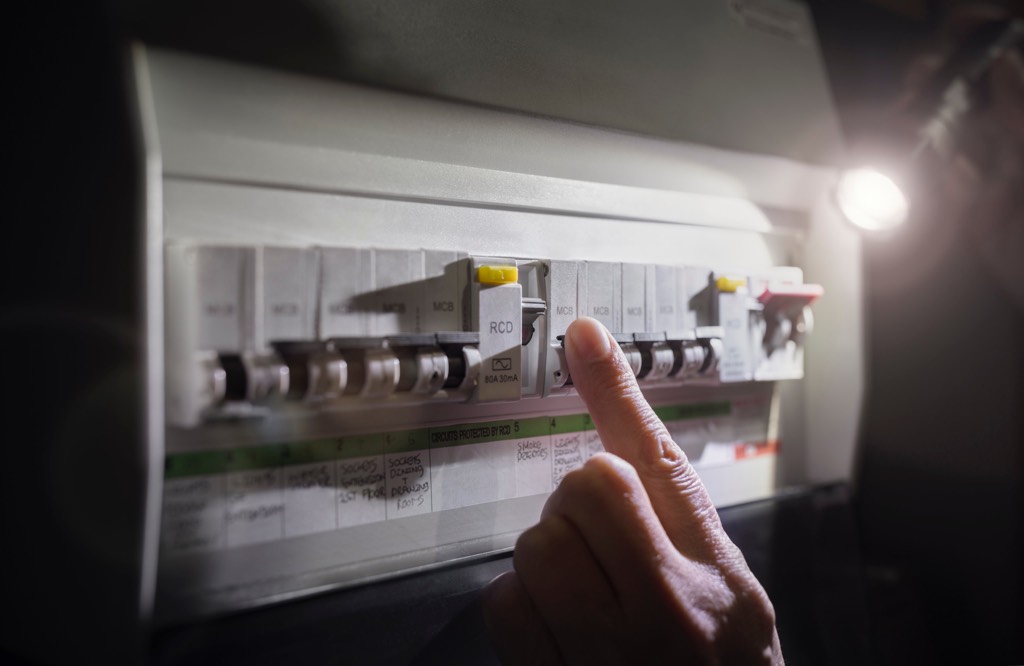What size breaker does a heat pump need?
In the UK a heat pump will typically use around 7500 Kilowatts of power and require a 32 amp breaker. Some smaller units will run on 15 or 25 amps.
In the US, a typical 2 ton heat pump will require a 25-30 amp breaker.
Installing a heat pump is not a DIY job. Understanding electrical requirements and current draw is very important and you should always get an HVAC professional to install your heat pump.
Measurements of energy
This article will help you understand how many amps an air- source heat pump or a ground-source heat pump will use. But before we jump in, let’s take a quick crash course in the terminology we use to describe an electrical system.
Amps
Amps are the measure of the volume of an electric current, or how much electricity is passing through the circuit. If you use the analogy of a garden hose, you can think about Amps as the amount of water passing through the hose at any one time. The number of amps is expressed simply as Amps or amp circuit. Amp breaker is also used to indicate what kind of size breaker you will need.
Voltage
Voltage is the force of the electric current. Continuing our analogy, you can think about voltage as the force of the water passing through the hose. You may only have a small amount of water, but if you compress the hose, the water will pass quicker and more forcefully through it. Low voltage will push the electricity slowly while higher voltage will push it faster. Voltage is expressed as Volts (v)
Domestic electricity in the UK is normally supplied at 230v.
In North America domestic electricity is normally supplied at 110v
Watts
The number of Watts is the measure of the total power in the current. Its formular is simple – Volts x Amps (expressed as Watts). A thousand Watts is a Kilowatt or KW.
Thus 20amp heat pump running on a 230v supply would generate 4,600 W or 4.6KW of power.
20A x 230V = 4,600W = 4.6KW
A Kilowatt Hour, as the name suggests, is the running of one kilowatt for one hour and is often used to measure the amount of energy expended.
Measuring the power of a heat pump
The amount of power a heat pump puts out will depend on the type of heat pump and the heat pump size.
In the UK, the amount of power of a heat pump system outputs is normally expressed in Kilowatts. A typical heat pump for domestic use is around 7.5KW. This heat pump would output around 7.5KWA if it was run continuously for one hour. As a side note it would consume a lot less, as heat pumps typically output 3 x as much energy as they take in depending on the seasonal energy efficiency ratio
In North America, the power of a heat pump is expressed as British Thermal Units or BTU unit. A BTU is the power required to heat a pound of water by one degree Fahrenheit. One KWA is the equivalent of 3412 BTUs.
Because the BTU is such a small unit, the North American engineers tend about heating capacity in terms of ‘tons’ or ton unit A Ton is 12,000 BTUs or around 3.5KWA. Thus our typical 7.5KW UK heat pump would be the rough equivalent a 2-ton heat pump in the USA.
Split vs Monobloc heat pumps
A split system will have two units. A condenser will collect heat from the outside air and send this, via liquified gas to an indoor unit inside your home. This gas is then compressed further by the indoor unit, where the heat is extracted and circulated inside.
In a monobloc unit, all the heavy lifting is done outside. The outdoor unit contains a compressor and heat exchanger. Hot water is then sent inside the home directly.
It’s important to understand the difference as with a split system you will have two units to think about.
The electrical requirements of your heat pump
We do not recommend installing a heat pump yourself. It is always a good idea to engage the services of a qualified HVAC engineer. The information given below is for guidance only. You should always seek professional advice before doing any electrical work on your home.
However if you are just here to do research and find out how many amps your heat pump will use read on.
Choosing the right circuit breaker
The instructions on the heat pump should indicate what kind of breaker size you will need. Normally this can be found on the nameplate data or electrical panel on the unit. In the UK, a 32amp breaker should be sufficient for most heat pumps you are likely to purchase. Some smaller models will run on 16amp or 25amp breakers.
If you are installing your heat pump in the UK, one thing to consider is the total full load supplied to your home. For older houses, the total domestic supply might only be 60amps which may not be enough power. Once you subtract the 32amps required for the heat pump, an ev charger, and other domestic items, you could find yourself in a negative amp scenario where the overall load is higher than the load supplied. In this situation we would recommend an upgrade to a 100amp supply.
New homes tend to have 100amp main fuses, so this is less of an issue.
In the US a typical 2-ton heat pump will require a 25-30amp breaker. We like this chart below from homeinspectioninsider.com
| AC Size | BTU | American Wire Gauge (AWG Size) | Breaker Size |
| 1 ton | 12,000 | 14 gauge | 15 amp |
| 1.5 ton | 18,000 | 12 gauge | 20 amp |
| 2 ton | 24,000 | 10 gauge | 25-30 amp |
| 3 ton | 36,000 | 8 gauge | 30-40 amp |
| 4 ton | 48,000 | 6 gauge | 50-60 amp |
| 5 ton | 60,000 | 4 gauge | 60-70 amp |
| 6 ton | 72,000 | 2 gauge | 80-90 amp |
| 7 ton | 84,000 | 1 gauge | 100-125 amp |
Choosing the right wire size
When choosing the right kind of wire gauges for your heat pump you need to consider the size of the unit, the power required, the length of the cable run and the type of cable that you will use.
A qualified electrician will be able to calculate the correct cable size for each installation. We do not recommend doing it yourself.
In the UK the British Standard Wire Guage (SWG) is not really used anymore. Wire sizes are normally given in mm. In North America they use American Wire Guage (AWG) which corresponds loosely, but not exactly to the UK system. We like this conversion chart from Vital Parts.
| BWG (UK Sizes) | Thickness (mm) | Thickness (in) | AWG (US Size) | Thickness (mm) | Thickness (in) |
| 30 | 0.315 | 0.0124 | 30 | 0.255 | 0.01 |
| 28 | 0.376 | 0.0148 | 28 | 0.321 | 0.0126 |
| 26 | 0.457 | 0.018 | 26 | 0.405 | 0.0159 |
| 24 | 0.559 | 0.022 | 24 | 0.511 | 0.0201 |
| 22 | 0.711 | 0.028 | 22 | 0.634 | 0.025 |
| 20 | 0.914 | 0.036 | 20 | 0.813 | 0.032 |
| 18 | 1.219 | 0.048 | 18 | 1.024 | 0.0403 |
| 16 | 1.588 | 0.0625 | 16 | 1.291 | 0.0508 |
| 14 | 2.108 | 0.083 | 14 | 1.829 | 0.072 |
| 12 | 2.769 | 0.109 | 12 | 2.392 | 0.094 |
| 10 | 3.569 | 0.1406 | 10 | 3.048 | 0.12 |
| 8 | 4.572 | 0.18 | 8 | 3.759 | 0.148 |
| 6 | 6.045 | 0.238 | 6 | 4.877 | 0.192 |
| 4 | 7.62 | 0.3 | 4 | 5.588 | 0.22 |
| 2 | 9.525 | 0.375 | 2 | 7.348 | 0.289 |
| 0 | 12.7 | 0.5 | 0 | 8.252 | 0.325 |
| 0 | 15.875 | 0.625 | 0 | 9.525 | 0.375 |
| 0 | 19.05 | 0.75 | 0 | 11.684 | 0.46 |
Voltage drop – occurs when electricity travels through the wire. It should not exceed 3% for heat pumps that use R-410A refrigerant and 5% for heat pumps that use R-22 refrigerant.
Exceeding the voltage drop can cause your heat pump to overheat and damage
Three phase vs single phase
In a single-phase system, the current flows between a live and a neutral wire. Domestic properties in the UK are normally connected with a single-phase supply as this is what most domestic appliances use.
In a three-phase system, three alternating currents supply a constant power source that never drops below zero. Some commercial appliances and commercial buildings use three-phase power.
Some heat pumps which are sold in the UK for domestic purposes require a three-phase supply, but it’s not that common. If you do require a three-phase supply and you do not have one you will need to speak to your electricity provider about getting upgraded. Bear this in mind when thinking about how many amps your heat pump will use.
How many amps does a heat pump use – in summary
We hope this article has given you some idea of how many amps a heat pump will use. We cannot reiterate enough that installing a heat pump is best left to the professionals. For more information about sourcing a good HVAC engineer please see our article on how to find a good heat pump installer.

